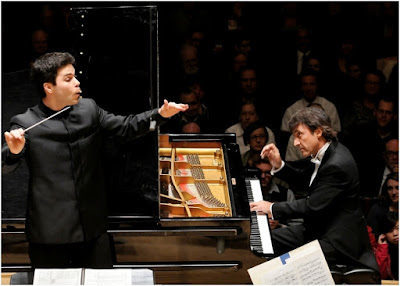Or
Trapped in the Metropolitan Opera House!
 |
"There's got to be a way out of this place! But where?"
The author, trapped somewhere in the Metropolitan Opera House. |
The (Metropolitan Opera House, located at W. 64th St. and Amsterdam Avenue) is big. Really big. It's so big you can't imagine it. Well, it's not quite as huge as Douglas Adams' description of the infinities of the universe, but the building is actually a 57-story skyscraper, lying on its side in the middle of Lincoln Center.
There are vast corridors, workshops, underground passageways, rehearsal spaces, storage facilities and dressing rooms, not to mention three restaurants and a really big auditorium within its walls. Here's a quick look at what's coming up in 2012 in the Spring season, set to the tune of a holiday classic. Feel free to sing along. One, two three....
On the first day at the opera, Wagner gave to me,
(One of the planks whacked me on the head!)
On the second day at the opera, Donizetti gave to me
(Somebody locked me in a dressing room.)
On the third day at the opera, Massenet gave to me
(I disguised myself as a supernumerary.)
On the fourth day at the opera, a bunch of composers gave to me
And a great big clunking machine.
(I spent the night in List Hall.)
Four confused lovers, three French tricks, two bottles of vino,
And a great big clunking machine.
(I'm camping in the prompter's box.)
On the sixth day at the opera,
Mozart gave to me,
And a great big clunking machine.
(I've been employed as an emergency usher.)
On the seventh day at the opera,
Janáček gave to me,
Seven lawyers litigating, six heavily armed peasants, fiiiiive great big clocks!
Four confused lovers, three French tricks, two bottles of vino,
And a great big clunking machine.
(I can't believe I've been stuck in this building for a week!)
On the eighth day at the opera,
Verdi gave to me,
Eight pyramid schemes,
seven lawyers litigating, six heavily armed peasants, fiiiiive great big clocks!
Four confused lovers, three French tricks, two bottles of vino,
And a great big clunking machine.
(I'll just sleep behind the Revlon Bar.)
On the ninth day at the opera, Britten gave to me
Nine sailors scheming, eight pyramid scams, seven lawyers litigating,
six heavily armed peasants, fiiiiive great big clocks!
Four confused lovers, three French tricks, two bottles of vino,
And a great big clunking machine.
(House detectives are looking for me.)
On the tenth day at the opera,
Puccini gave to me,
Ten divas leaping,
nine sailors scheming, eight pyramid scams, seven lawyers litigating,
six heavily armed peasants, fiiiiive great big clocks!
Four confused lovers, three French tricks, two bottles of vino,
And a great big clunking machine.
(They're starting to run out of little sandwiches.)
On the eleventh day at the opera,
Verdi gave to me
Eleven bandit hats,
ten divas leaping, nine sailors scheming, eight pyramid scams, seven lawyers litigating,
six heavily armed peasants, fiiiiive great big clocks!
Four confused lovers, three French tricks, two bottles of vino,
And a great big clunking machine.
(Finally, a chance to raise and lower the chandeliers!)
On the twelfth day at the opera, Mussorgsky gave to me,
Twelve doomed Streltsy,
Eleven bandit hats, Ten divas leaping, Nine sailors scheming,
Eight pyramid scams, Seven lawyers litigating,
Six heavily armed peasants, Fiiiiive great big clocks!
Four confused lovers, three French tricks, two bottles of vino,
And a great big clunking machine!!!!
(I think I finally found the exit!)
Happy holidays to all of you!




















